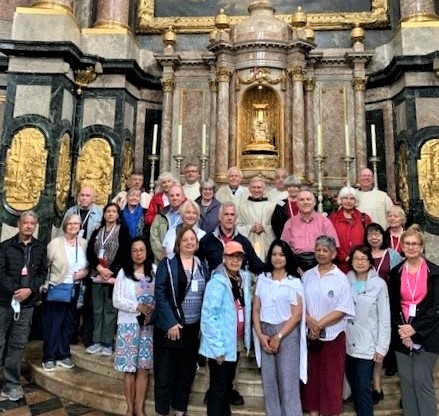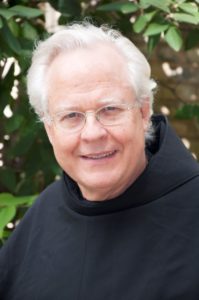
Several friars of our province {top row left to right}: Friar John Voytek, OFM Conv., Friar Mirosław Podymniak, OFM Conv., Friar Ed Ondrako, OFM Conv., Fr. James McCurry, OFM Conv., Fr. Jobe Abbass, OFM Conv. and Fr. Bob Benko, OFM Conv.} on the Franciscan Marian Shrines of Europe Pilgrimage, from August 13 -25, 2022, including attending the Passion Play at Oberammergau, Germany. Pictured here at the Ettal Abbey, the largest Benedictine monastery, on the morning of the Passion Play.
CAN I KNOW TRUTH?
12 Days on Pilgrimage in August
“I am the way, and the truth, and the life” Jn 14:6.
Can I know truth? Can I know fundamental truths about myself, my origin and future? Do I live in a twilight that cannot be illuminated? Must I restrict myself to what is useful and provable scientifically? These are fair questions for our age. Geoffrey Chaucer wrote Canterbury Tales, raucous stories told by pilgrims traveling to a sacred pilgrimage site in England. From Francis of Assisi to Vatican II, Catholics remember the theme of life as pilgrims.[1] In August, I joined twenty-eight pilgrims on a Marian Franciscan Pilgrimage.[2] Pilgrims share stories. The question about truth was the essential question I heard about challenges to Christian faith. Unwittingly, perhaps, the pilgrims were asking questions that have to do with philosophy.
To sketch the question of truth in our world characterized by relativism is the favorite phrase in the life’s work of the public theologian Pope Benedict XVI.[3] Happily, God aligned him with the philosopher Pope John Paul II who set out to reinstate the question of knowing truth.[4] The search is a rational and scientific task in our world which celebrates the positive developments of modern science. It is a doublet, however; for modern science, to a great extent, disqualifies the search for truth as being unscientific. We may not have known it, but the twelve days together in prayer was giving us more courage to embark on the adventure of seeking the truth and skills to articulate it to our families and communities with greater love.
Put another way, we pilgrims were discussing the need to make a bold account of Christian faith in a modern world that is not especially hospitable to it. We had a certain unity of themes about the Christian story from creation to last things that were taught to us from our youth. That is why I find the arc which Benedict’s career has given to theology accessible to the broad Catholic public, because it reflects the wisdom of the church tradition rather than his own creativity. I am setting out to provide a backdrop that will assist in reading his three encyclicals which have a different authority than the works he produced as an individual theologian.
Let’s begin by reflecting with Socrates, who told Phaedrus a story he had heard from the ancients who knew about truth. An Egyptian king was being told about the invention of writing. The king objected because he foresaw that it would be a means of recording and not remembering, that it would give the appearance of wisdom to pupils, but not wisdom itself. The king worried that people would hear much without learning anything and think themselves knowledgeable. He knew that in general they were ignorant and difficult people to deal with, for they appear wise but are not truly so.
Fast forward to our information age: no one denies the good associated with the explosion of information available in our world. In Phaedrus, Plato was warning about gaining information without working it into one’s thinking. Pope Benedict observes that a complex multi-cultural world, notwithstanding its claim to be neutral, is not always neutral. He asks: who is the referee? There are multiple religions. Are they equally valuable? Is one religion as good as another? Benedict, as a theologian, wants us to think deeply, to get to the truth. Christianity, to John Paul II who adopts philosophy finds ancient philosophy a help to get to truth. Philosophy costs us. Nihilism asserts that there is no truth and no meaning. Autonomy is self-rule, seeking to be free from most laws and coercion. Do we need a God? To be as autonomous as possible is to act with responsibility such as to aging parents, to accept one’s own failures, and to receive love and support from others. To Benedict, autonomy is good until it is not.
Historically, Christianity has behaved “badly.” To try to remedy by being nice is an unthinking response. To say I have my truth and you have your truth denies that there is such a thing as a truth claim. No claim to truth in favor of a common society is cleverness. There is a subversion of truth, a “slippage.” Catholic Christianity never threw philosophy overboard. Luther and the Protestant tradition does not have both, but “either/or,” either faith or reason. Catholicism always emphasizes “both/and” – both faith and reason. Revelation answers the questions of the meaning of the world and of the existence of God. Philosophy can inform theology that deals with ultimate questions. Revelation has provided answers which can benefit philosophy. John Paul II and Benedict get philosophy right, the relation of philosophy to faith.
The aim of these Benedict-inspired reflections is retention. What set of questions is in his text, and how do we go about answering what he has lovingly written? For example, Benedict points out what all twenty-eight of our pilgrims experienced. In the presence of family members or friends who are not thoroughly at home with ecclesiastical language and thought, sooner than later one gets the feeling that Kierkegaard sums up in his allegory of the clown and burning village. When a traveling circus caught fire, the manager sent the one already dressed to the neighboring village to fetch help. The villagers took the clown’s shouts as advertising and laughed till they cried. The more the clown tried to get the people to be serious that there was a real fire, the more they laughed. The circus and village were burned to the ground.
As a Franciscan, might some see my Franciscan habit and think of it as medieval or an old-fashioned clown costume? Might whatever I say about truth claims be classified as not to be taken seriously? The analogy applied to our pilgrims. They are Catholic teachers and parents who speak to their children and grandchildren about Christ’s gifts, such as the seven sacraments. Do children dismiss parents, teachers and clergy as just giving a performance that has nothing to do with the reality of another generation which they see in themselves? That is precisely the point of a true pilgrimage – namely, our examination of conscience in this philosophical and theological call to keep going deeper.
________________
Fr. Ed Ondrako, OFM Conv. Univ of Notre Dame, eondrako@alumni.nd.edu
[1] Vatican II, Lumen Gentium, ch. 7. The Mystery of the Church links with Gaudium et Spes, the Church and the World. Vatican II is irreplaceable until it isn’t.
[2] 13-25 August 2022: Prague, Czech Republic; Altoting, Munich, Oberammergau, Ettal, Germany; Salzburg, Melk, Maria Zell, Vienna, Austria; Bratislava, Slovak Republic; Estergom, Budapest Hungary.
[3] Joseph Ratzinger was born in 1927 in Catholic Bavaria and loved the Shrine of Our Lady at Altoting. The Passion play at Oberammergau and many visitors to the Benedictine Monastery at Ettal, where Dietrich Bonhoeffer remained safe until his arrest at the end of World War II, are signifiers. As I traveled, I mused: how Catholic is Bavaria today? What is the status of Christianity in the first world today?
[4] Pope St. John Paul II, Fides et Ratio, 1998. One can make a claim in truth without noxious side effects.
Fr. Edward J. Ondrako, OFM Conventual
Research Fellow Pontifical Faculty of St. Bonaventure, Rome
Visiting Scholar, McGrath Institute for Church Life
University of Notre Dame
Holy Name of Mary – September 12, 2022
